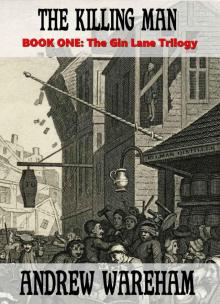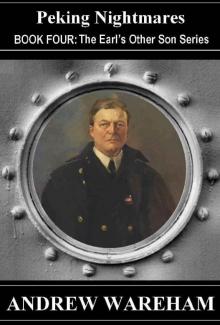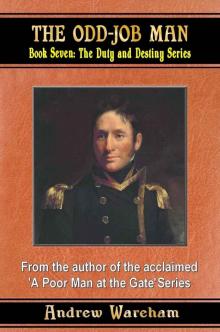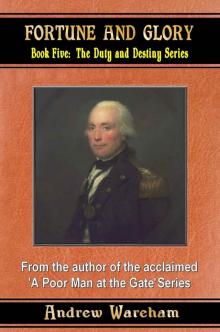- Home
- Andrew Wareham
Long Way Place (Cannibal Country Trilogy, Book 1) Page 3
Long Way Place (Cannibal Country Trilogy, Book 1) Read online
Page 3
The work was simple enough. He was given a rip-hook, bill-hook and felling axe, a pitchfork and spade and prong, told that the land needed be cleared. There was three acres this side of the trees, two on the other. Over the course of the winter he was to cut down and grub out all of the clumps of bramble and the patches of stinging nettles. In the spring they would hire a plough team and a harrow, then set lawn seed across all the ground that was ready. When he had cleared the open land, then he should work his way in between the trees, cleaning out the scrub there and making all neat and tidy. If he finished that, then there was work in the kitchen garden behind the house, but that was less important – Cook enjoyed gardening herself.
He had never swung a grass hook or cut brambles before, had no idea how to handle an axe, but he learned. Cook showed him.
He worked slowly at first, his hands blistered and his back hurting, but as he muscled up and grew used to steady application he began to make a visible difference to the grounds. He grew a little taller as well.
Mrs Colonel appeared occasionally and made vague noises of approval. Odd members of the family sometimes glanced at what he was doing. There were, he gathered, a couple of daughters, mostly in the stables down the road at the farm except when doing their lessons indoors, and a son at school, at a place called Oundle. Cook sniffed mightily when she informed him of this – Master Christopher had been unable to achieve entry to Winchester, not much between the ears, it would seem. He would be made into a soldier at Oundle, that or a banker, neither occupation demanding an intellect, so she said.
Mostly he was on his own, and he did not mind that, too much.
He worked six days a week, dawn till dusk, not a great imposition as winter days grew shorter and shorter, was so tired that he slept long each night, had no time to grow bored. Sundays were a problem at first, but he discovered a rusted bicycle in the back of his shed, started to clean it up, then found an interest in getting it to work again. By Christmas he had it in condition to ride and was able to go out for an hour or two, exploring the area, looking at the countryside and trying to discover what people saw in it.
The Christmas holiday had its own little problem. Master Christopher, home from school and the man of the house – he was a year or two older than Ned – found the need to oversee his work and tell him how to do it better and where to direct his efforts. Cook observed and advised him to say ‘yes, sir’, to do as he was told and ignore the fact that he was being slowed down by the boy’s interference – it would be easier that way. On no account was he to give him the clip round the ear he so thoroughly deserved. He was bigger than Ned, taller and strongly made, but he was soft inside, would fold and run if he was threatened. Ned had only contempt for him.
Ned obeyed – Master Christopher was a pain in the arse, but he would be back to his school within a week or two, could be forgotten about for another two or three months then. He stood quietly, listened, said, ‘Yes, Master Christopher’, and went to work where the boy told him. He became aware that he was disappointing him – he would have preferred some opposition to crush. He became certain of it when the boy brought the older of his sisters with him, so that she could see her masterly big brother in action, admire his manliness. Ned had met his sort before – inadequate bullies who were unable to subdue their equals, took care to impose upon those who were inferior – the frail, the stupid, the young.
Down by the docks the solution was easy, and brutal. Here there was still no other answer but he was not allowed to hand out the beating the boy deserved.
“You will have to watch him when I go back to school, Tildy. Mama will not do it, you know, and I’m sure he will be a frightful slacker if we let him get away with it. His sort always are, you know.”
“Yes, Christopher,” she murmured dutifully, glancing at Ned and raising her eyes heavenwards in long-suffering patience.
“All of the area behind the trees to be completed by the end of the month, I think. That will keep him busy! Do make sure that you check him, won’t you?”
“Yes, Christopher, I shall come out at least twice a week.”
Christopher left for the station, back to insignificance at school; Ned worked on through a wet January. It snowed and sleeted frequently and, rather than run back to his shed whenever it got too cold for him, Cook told him he should make a little hut under the trees – ‘better that he should be out of sight when he was taking a break’. She pointed out where there was a tarpaulin that could be draped over a branch and a couple of low uprights and tied firmly in place. A thick layer of brush made a floor, a hearth of flints at the entrance for a low fire of dry wood. It kept his tools clean and free of rust as well.
Tildy came out twice a week, as she had promised, explaining that she had to keep her word. She was increasingly talkative, Ned found, inclined to stay and chatter about nothing in particular. He noticed that she was almost grown up, had breasts and hips on her, darker in colouring than her mother but quite good-looking – healthy at least. He kept very strictly to himself – he liked it here, was not going to spoil things. He became even more determined to stay after Mrs Colonel bought a car and hired a chauffeur, a pleasant young chap who talked to Ned and shared the kitchen table as the only other man on the staff and very soon took him on as his assistant with maintenance on the Panhard. Ned was fascinated with the motor, and it made sense to him – the engine was logical, its parts fitted together in a rational way. He very rapidly learned the basics of motor mechanics, would often sit down of an evening with the manual that came with the car, slowly reading and learning, absorbed in the logic of the machine. It made a change from Cook's penny-dreadful Westerns which she let him borrow.
On a mid-week morning he looked up from the ditch he was cleaning along the boundary behind the trees as the car went out, Mrs Colonel and girls in it, he presumed. Five minutes later he heard Tildy’s voice, singing to herself as she walked towards him.
“Mama has had to take Wendy to the dentist in Winchester and I did not wish to go and wait an hour there before we did whatever else might be important today. Mama will drift through the shops all of the afternoon, you know, terribly tedious! The sky is awfully black, Hawkins, do you think it will snow?”
The first flakes answered her.
“It may not be much, Miss Tildy, but you’d better go indoors out of it.”
“We can wait in your little shelter, just to see what happens.”
She turned and walked across to the trees without waiting for his opinion on the matter. He followed, mainly because he did not want to get wet and spend the rest of the day freezing as a result. The wind was blowing in from the front and he pulled the spare flap of the tarpaulin across, almost closing them in.
“I’m cold, can you spread your coat across my shoulders, too?”
Again without waiting for his agreement, she snuggled up to his side and pressed close against him. He put his arm round her, having little choice in the matter.
“I say, Hawkins, that’s jolly nice. I’m quite warm now.”
The snow flurry stopped and he stood up, led her firmly out of the shelter.
“Better you should go back to the house, Miss Tildy.”
“I’ll come back tomorrow, Hawkins.”
Almost every day for the rest of spring she was there for some part of morning or afternoon. A week before Master Christopher came home for holidays he ‘accidentally’ set fire to the shelter, salvaging the tarpaulin first. The next day she was waiting out of sight in the tool shed behind the wall of the kitchen garden when he came out from his luncheon, blushing scarlet as she put her arms round his waist and very clumsily kissed him. He responded, hands carefully and very chastely placed. This was dangerous – he wanted to stay at Valley House, he had nowhere else to go and he liked it here. If he rebuffed her she might go to Mama in indignation, making up any sort of tale. If he accepted her advances then she could easily end up in the family way – for he knew of no other end to courtship, had never he
ard of platonic love, would have laughed incredulously if it had been explained to him.
Master Christopher came home, having evidently had a very bad term. He had not been selected for the rugby team, as he should have been, had it been a question of pure merit. He doubted he would play cricket for the school, though, he assured them, he expected to be House captain. He had been knocked out boxing for his House - bad luck, he had slipped and the other chap had caught him while he was off balance. He had not, in fact, had the success he deserved – it had all been rather rotten. He chased Ned unmercifully, demanding to know why he had not finished such a minor job as he had been set, sure the cause was idleness – he was obviously a dreadful slacker. At the end of three weeks Ned had to force the words of polite submission to his lips, doffed his cap resentfully – to Hell with him and his family, he would take no more!
The day after Christopher left, Tildy resumed her visits to the tool shed, asking if her ‘dear Hawkins’ had missed her.
“Christopher ordered me to keep a careful eye on you, Hawkins, told me I must watch you every day!”
She smiled as engagingly as she knew how, hands on hips, invitingly. He knew that she would be on her back for him within the week. He suspected that she would be pregnant within a very short time thereafter - healthy, well-fed, robust as she was. Just as soon as her mother found out then he would be in line for prison - they would shout rape to save her name, and to ensure that a doctor would look after the problem for her. Abortion was illegal, but only for the poor.
It was too great a risk. He did not need ten minutes in the hay that badly. Besides that, she hardly knew what she was about - sheltered and silly as she was.
He returned her smile, kissed her thoroughly and chased her back indoors before she was missed.
He knew the railway times, had discovered them weeks before. There was a milk train to Waterloo at one thirty in the morning, taking churns from the local dairies to London, non-stop after Basingstoke. There was a last train to Southampton a few minutes before, and they would assume that he had headed back to his home area, if they made enquiries, if he was seen near the station. He did not think they would make any great public fuss – not wishing to advertise his activities to the local gossip-mongers.
He rolled out through his window soon after midnight, bag over his shoulder, padding along the grass verge so as not to crunch on the gravel drive. There was no moon, which was a nuisance, but he knew the road, was slowed only a little. He had saved the small wage he had been paid – two shillings a week, quarterly – and had brought nearly five pounds with him from the tobacco money; he had a month’s easy living, at least. He sat on the grass across from the station until he saw the Southampton train come in and pull away, then sidled onto the platform for the up train. The ticket office was closed, but he would be able to pay the guard in the single carriage at the back of the mixed train.
He chose a seat away from the few lights in the almost empty carriage, leant back into a corner. On impulse he got off at Basingstoke, took the first workman’s local to Reading an hour later. The guard would be able to tell them he had a ticket to London, might assume he had been caught short and had had to use the toilet facilities on the station – there were none on board. Any search would look for him at Waterloo – there should be none, but it made sense to act as if there would be. He got on board a train for Bristol half an hour later. He knew nothing of Bristol, except that it was a blue-water port. But he knew nothing of London, either, except that it was the home of Scotland Yard, and everybody knew about them.
Bristol was impossible – he had drifted to the docks, naturally enough, and found them to be sewn up tight. Two local gangs had a monopoly of all activity there, one working the girls and the streets, the other the warehouses. He was informed, very politely, that there was nothing for outsiders within the hour of taking his first look round. He weighed up the four toughs who had stopped him and given him the message, opened his arms very carefully to display empty hands.
“I was just looking – I got out of Southampton fast, ended up ‘ere by accident. Nothing doing, you says?”
“Nothing at all, and no place for anybody else at all.”
“Right, mate, sorry – my mistake.”
“It’s all right, nipper – we all makes mistakes. I was at Southampton two year ago – it’s different there. You going back?”
“Better not.”
“Then you got nowhere to go, I reckons. Most places are like it is ‘ere.”
Ned could almost recognise the man he was talking to, realised suddenly that it could have been himself. Just another, ordinary gutter rat with a living to make.
“I can’t stay, and I got nowhere to go. Tough, ain’t it!”
They grinned sympathetically. There was going to be no fight, no need to use the knives and billies tucked away in their jackets – they could be friendly.
“Sign on, mate. It’s getting ‘arder to jump ship in the States, but Canada’s open, and so’s South Africa, or Australia.”
Ned shrugged – that was always at the back of his mind. He had no skills as a deckhand, it would have to be the stokehold.
“Point me to the agent, mate?”
“Nah, we’ll go with you, just to make sure you don’t get lost!”
They laughed, all very friendly, pals together – for the next five minutes and as long as he did nothing stupid.
“Black gang, mate?”
“Not much choice, is there.”
“Not much. Blue-water or coastal?”
“Far foreign, I reckons, as far as can be.”
They nodded respectfully, convinced he had a good need to run - he was probably a killer, they decided, the noose waiting in England if he got careless. He looked a hard little man, had had enough sense not to fight odds of four to one, so he had nothing to prove, did not have to show that he was a tough customer and as big as the next man, because he knew he was. The further away he went, the better for all of them. They were very polite to him for the next few minutes, escorted him into the agent’s office, nodded to the clerk to pass them through to the man himself.
“Morning, Mr Nicholls – our friend ‘ere needs a card and a berth out, without too much ‘anging about. Going to ‘ave to be the stoking, ‘e ain’t never been to sea before.”
Nicholls had a living to make, and he knew that the gang was fair. He would be able to call a favour back from them when he needed one – and anybody working the docks needed favours sometimes.
“’Star of the South’ sails on the afternoon tide, gents, and she’s short one stoker, due to him getting very drunk and thumping a copper last night. He should be out of the Infirmary next month and then he’s going up before the judge. Never a good idea to kick a sergeant where it hurts and then stand there laughing and pointing a finger at him, not when he’s got six constables behind him!”
They laughed, enquired which sergeant, smiled grimly then. They had all wished to place a useful boot there at one time or another.
“Hawkins, Edward Albert – there is your seaman’s card, and it happens to be very nearly good – don’t show it too often in Bristol, though. Take this ticket through to the Albert Dock – I am sure these gentlemen will show you the way – and show it to the copper at the gate, and he will call an officer from the Star to collect you and give you the once over. There should be no trouble – they know they have to take whatever comes if they want to sail with a full crew. Captain Stobart will probably want to look at you himself. Take your cap off and call him sir and he will be happy.”
“Thanks, Mr Nicholls. Where is she bound, sir?”
“Brisbane, by way of Singapore and Perth, I believe, then back again. Bunkering stops as necessary, of course. She might do the round trip by Christmas, seven or eight months, depending on getting her cargo on time and not hanging about in port waiting.”
Ned nodded, deliberately straight-faced. It all sounded really rather exciting, but he could not concei
vably say so in this company.
LONG WAY PLACE
Chapter Two
The stokehold transpired to be very nearly the least exciting place Ned could imagine. Dartmoor Prison might have rivalled it, but could not have been worse, and if he went to Hell he would find the conditions familiar, though possibly not so hot.
The Star was a medium sized cargo liner, some six thousand tons, powered by twin screws, which meant two boilers to feed, two stokers to each, working the normal four hour watches, turn and turn-about. She cruised at just over eight knots, two hundred nautical miles a day. Her bunkers were good for an Atlantic crossing, needed be refilled with coal every eighteen to twenty days. Normally, in European and American waters, the work was physically hard, but not too much so for a reasonably fit young man.
Tap the bar on the furnace door to open it – using the edge of the wide, flat-bladed shovel. Then load the shovel at the bunker mouth, a step forward and throw the coal in, twisting the shovel blade to spread the fuel evenly across the fire bed. Knock the door shut again and wait two or three minutes while your mate threw his load in, then repeat. The temperature in the hold had been a steady eighty-five to ninety as they steamed out of Bristol and across the outskirts of Biscay and down to Gibraltar, hot but not unpleasant compared to the winter cold topside. Ned had listened, watched, learned quickly to balance against the roll of the ship, was pulling his weight by the end of the first couple of days.
The job was not difficult to pick up. Had it been complicated most of the other stokers could not have done it. He could imagine that it would be extremely difficult in a big storm, the ship pitching and rolling and threatening to spill hot coals out of the fire box or tip the stoker in with his shovel. The other stokers told him that they would run from a storm, if at all possible, the captain knowing how difficult it could be to maintain a head of steam in those conditions and aware that the ship would go down if the engine failed. It was not like the navy where they had to keep their course no matter what. Under the ‘Red Duster’ flag they could use their sense, and did, and many fewer stokers died in the Merchant Navy.

 A Killing Too Far
A Killing Too Far Killing's Reward
Killing's Reward A New Place
A New Place The Killing Man
The Killing Man Bold and Blooded
Bold and Blooded The Breaking Storm (Innocent No More Series, Book 2)
The Breaking Storm (Innocent No More Series, Book 2) Nobody’s Child
Nobody’s Child 04 Peking Nightmares (The Earl’s Other Son Series, #4)
04 Peking Nightmares (The Earl’s Other Son Series, #4) Red Man
Red Man Foreign Mud
Foreign Mud The Gathering Clouds (Innocent No More Series, Book 1)
The Gathering Clouds (Innocent No More Series, Book 1) 06 A Soldier’s Farewell (Man of Conflict #6)
06 A Soldier’s Farewell (Man of Conflict #6) Chinese Whispers
Chinese Whispers 02 Shanghai Dreams (The Earl’s Other Son #2)
02 Shanghai Dreams (The Earl’s Other Son #2) Hungry Harry: An Orphan in the Ranks
Hungry Harry: An Orphan in the Ranks A Wretched Victory (Innocents At War Series, Book 6)
A Wretched Victory (Innocents At War Series, Book 6) Illusions Of Change (A Poor Man at the Gate Series Book 6)
Illusions Of Change (A Poor Man at the Gate Series Book 6) The Wages Of Virtue (A Poor Man at the Gate Series, Book 8)
The Wages Of Virtue (A Poor Man at the Gate Series, Book 8) Blood and Famine (Man of Conflict Series, Book 4)
Blood and Famine (Man of Conflict Series, Book 4) The Friendly Sea (The Duty and Destiny Series, Book 1)
The Friendly Sea (The Duty and Destiny Series, Book 1) Bursting Balloons (Innocents At War Series, Book 5)
Bursting Balloons (Innocents At War Series, Book 5) The Death of Hope
The Death of Hope Deadly Shores (The Duty and Destiny Series, Book 11)
Deadly Shores (The Duty and Destiny Series, Book 11) The Vice Of Virtue (A Poor Man At The Gate Series Book 10)
The Vice Of Virtue (A Poor Man At The Gate Series Book 10) Virtue’s Reward (A Poor Man at the Gate Series, Book 11)
Virtue’s Reward (A Poor Man at the Gate Series, Book 11) A Deadly Caper (Innocents At War Series, Book 2)
A Deadly Caper (Innocents At War Series, Book 2) The Pain Of Privilege (A Poor Man at the Gate Series Book 4)
The Pain Of Privilege (A Poor Man at the Gate Series Book 4) Far Foreign (The Duty and Destiny Series, Book 9)
Far Foreign (The Duty and Destiny Series, Book 9) Shores of Barbary (The Duty and Destiny Series, Book 12)
Shores of Barbary (The Duty and Destiny Series, Book 12) The Odd-Job Man (The Duty and Destiny Series, Book 7)
The Odd-Job Man (The Duty and Destiny Series, Book 7) Fire and Folly (Man of Conflict Series Book 3)
Fire and Folly (Man of Conflict Series Book 3) A Victorian Gent (The Making of a Man Series, Book 1)
A Victorian Gent (The Making of a Man Series, Book 1) Sugar and Spice (The Duty and Destiny Series, Book 6)
Sugar and Spice (The Duty and Destiny Series, Book 6) Dark Days Of Summer (Innocents At War Series, Book 4)
Dark Days Of Summer (Innocents At War Series, Book 4) Dire Shenanigans (The Making of a Man Series, Book 2)
Dire Shenanigans (The Making of a Man Series, Book 2) The Fuzzy-Wuzzy Man (The Duty and Destiny Series, Book 3)
The Fuzzy-Wuzzy Man (The Duty and Destiny Series, Book 3) Privilege Preserved (A Poor Man at the Gate Series Book 5)
Privilege Preserved (A Poor Man at the Gate Series Book 5) No Longer A Game (Innocents At War Series, Book 3)
No Longer A Game (Innocents At War Series, Book 3) An Uncertain Peace (The Making of a Man Series, Book 3)
An Uncertain Peace (The Making of a Man Series, Book 3) Fortune And Glory (The Duty and Destiny Series, Book 5)
Fortune And Glory (The Duty and Destiny Series, Book 5) The Old Order (A Poor Man at the Gate Series Book 7)
The Old Order (A Poor Man at the Gate Series Book 7) A Place Called Home (Cannibal Country Trilogy, Book 2)
A Place Called Home (Cannibal Country Trilogy, Book 2) Nouveau Riche (A Poor Man at the Gate Series, Book 2)
Nouveau Riche (A Poor Man at the Gate Series, Book 2) The Privateersman (A Poor Man at the Gate Series Book 1)
The Privateersman (A Poor Man at the Gate Series Book 1) Britannia’s Son (The Duty and Destiny Series, Book 4)
Britannia’s Son (The Duty and Destiny Series, Book 4) Long Way Place (Cannibal Country Trilogy, Book 1)
Long Way Place (Cannibal Country Trilogy, Book 1) Spanish Tricks (Man of Conflict Series, Book 5)
Spanish Tricks (Man of Conflict Series, Book 5) A Parade Of Virtue (A Poor Man At The Gate Series Book 9)
A Parade Of Virtue (A Poor Man At The Gate Series Book 9) A Busy Season (The Duty and Destiny Series, Book 8)
A Busy Season (The Duty and Destiny Series, Book 8) Billy Bacon and the Soldier Slaves (Colonial Warrior Series, Book 1)
Billy Bacon and the Soldier Slaves (Colonial Warrior Series, Book 1) Raging Rajahs (Man of Conflict Series, Book 2)
Raging Rajahs (Man of Conflict Series, Book 2) Victorian Dawn (A Poor Man at the Gate Series, Book 12)
Victorian Dawn (A Poor Man at the Gate Series, Book 12) Born To Privilege (A Poor Man at the Gate Series Book 3)
Born To Privilege (A Poor Man at the Gate Series Book 3) The Soldier Brat (Man of Conflict Series, Book 1)
The Soldier Brat (Man of Conflict Series, Book 1)